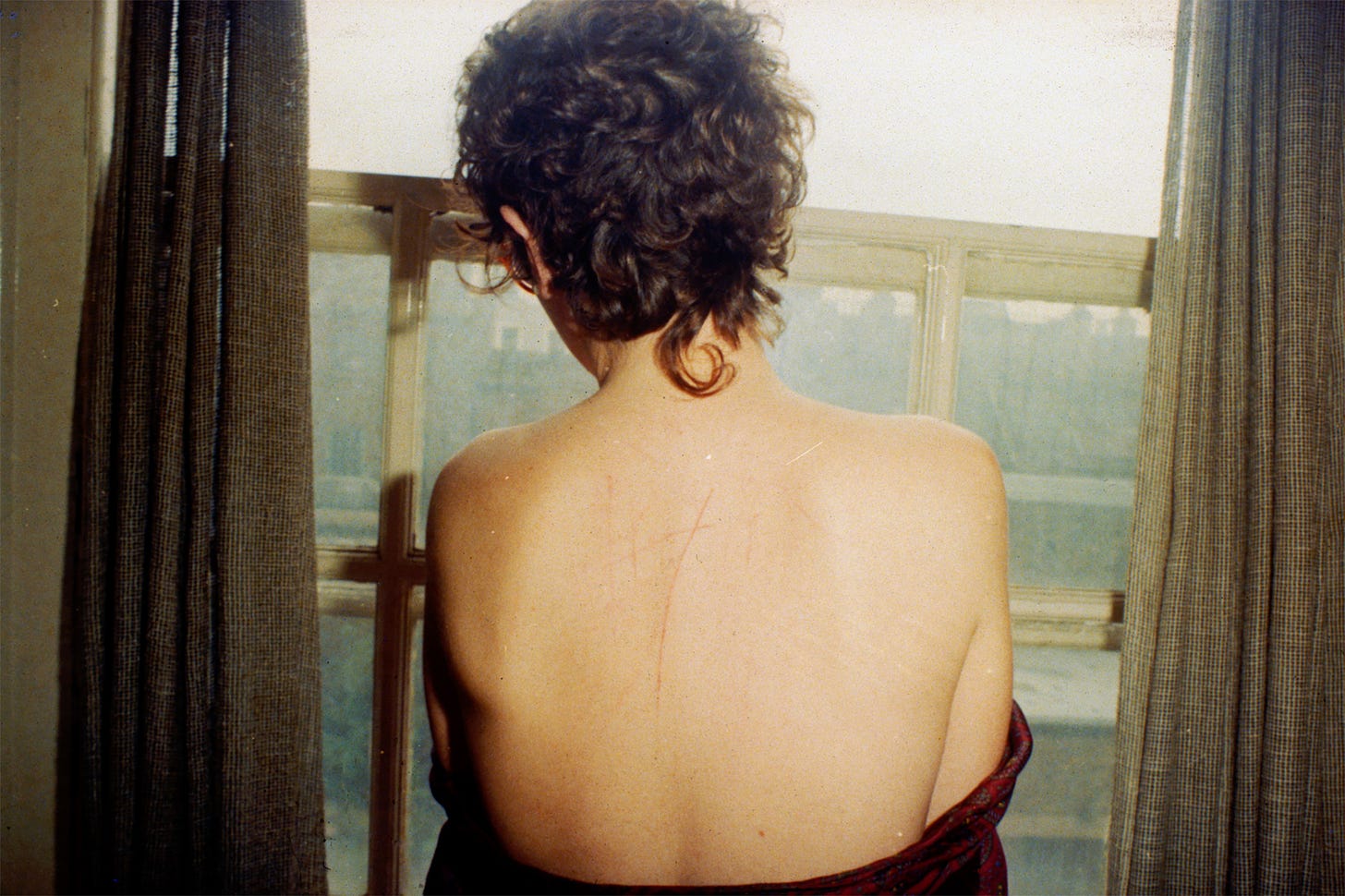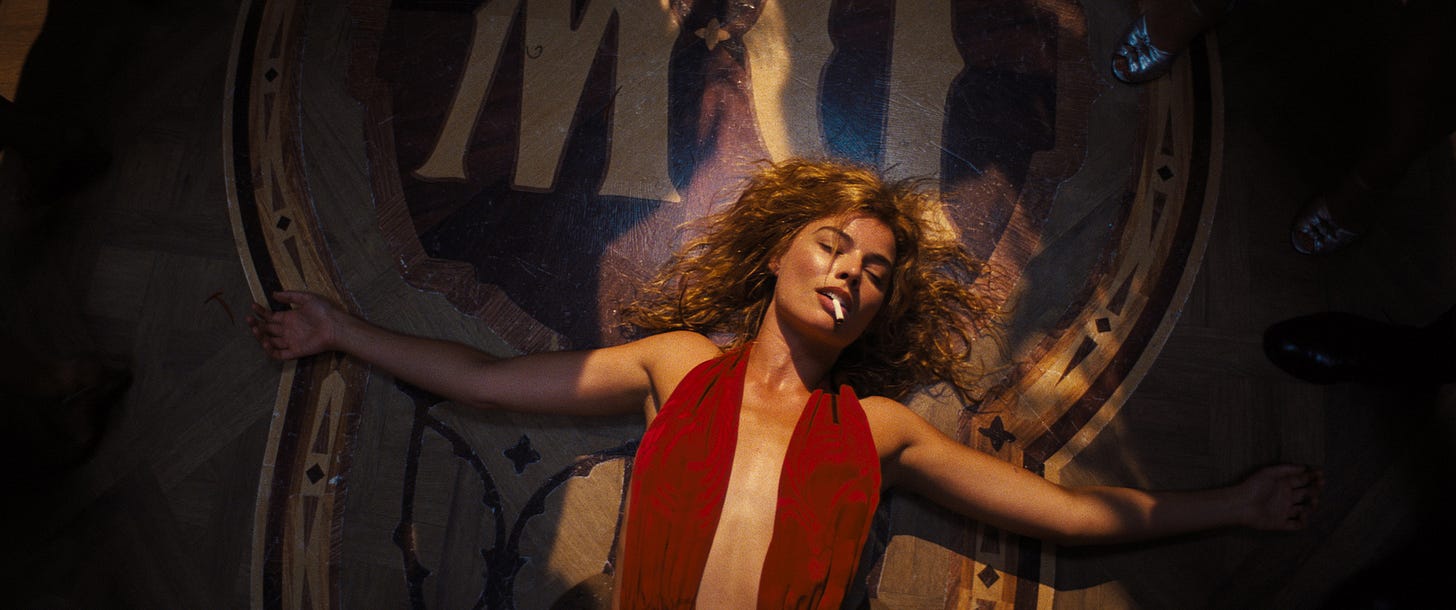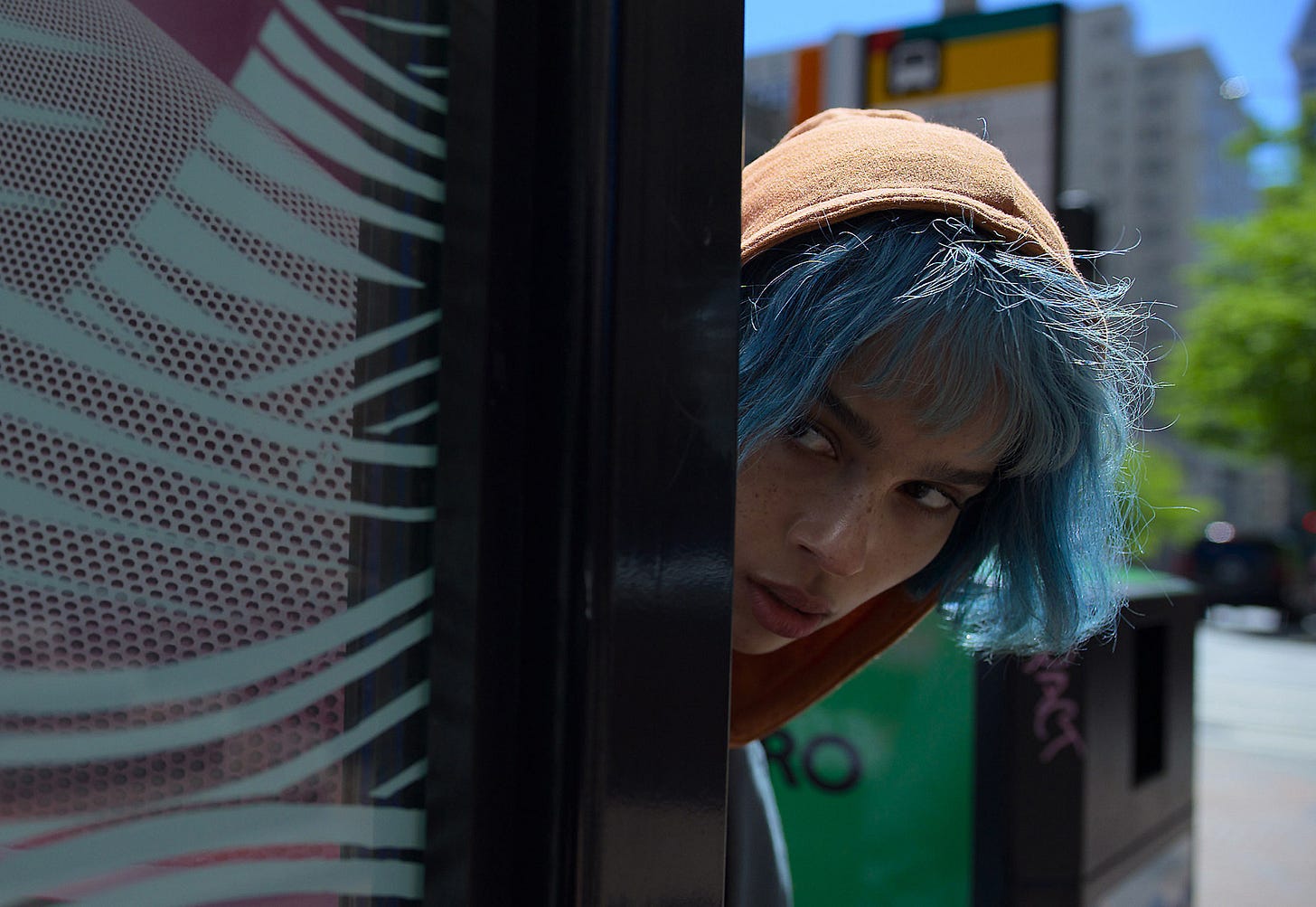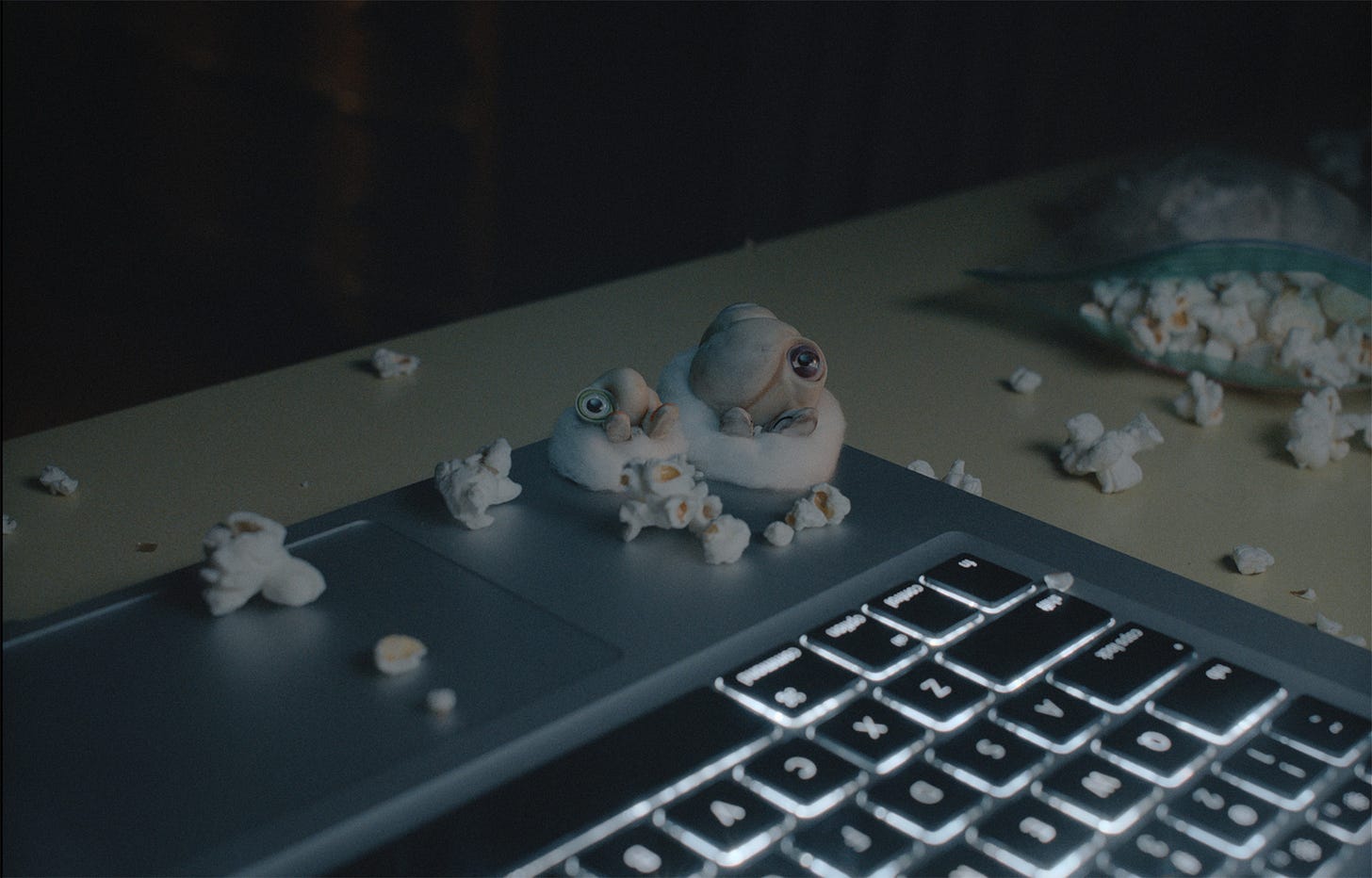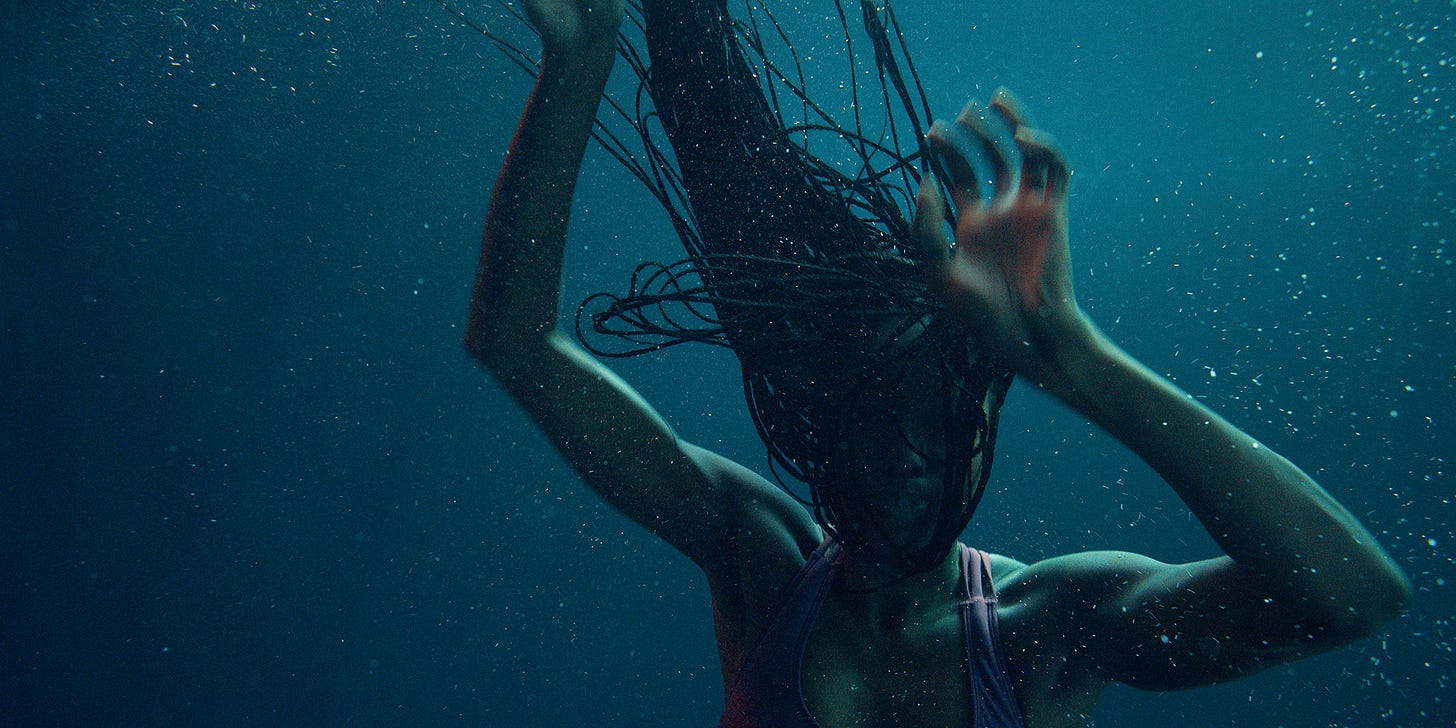Week Ending 12/16/22
FYC vote #1 approaches
I’m binging like crazy and yet it will never be quick enough. My nomination ballot for the Greater WNY Film Critics Association is due 12/21 and my watchlist doesn’t seem to ever get shorter. It finally looks like I might have a moment to watch more foreign films and then BABYLON arrives to take the place of two since it was three hours and ten minutes long. There are so many epics like that this year. TRIANGLE OF SADNESS is laughing at me because it knows I keep putting it off despite its two-and-a-half hours needing to be seen before that deadline too.
I will say this, though: A24 is dominating my nominations and Top Ten right now. I honestly didn’t think that would ever happen again as I’ve just not been as enthused by their films the past few years as I had in the past. There have been some brilliant outliers, but their slate as a whole has generally been overshadowed by Neon’s year-to-year offerings. EVERYTHING EVERYWHERE ALL AT ONCE, AFTERSUN, and AFTER YANG are just too good to deny. They’ve stolen the boutique indie crown.
What I Watched:
AFTER YANG
(now on VOD/Digital HD and streaming on Showtime)
When technobeing Yang (Justin H. Min) malfunctions, all Jake (Colin Farrell) is thinking about is having him fixed. Like an appliance. A thing. It doesn’t matter that he’s been a part of the family since he and Kyra (Jodie Turner-Smith) adopted Mika (Malea Emma Tjandrawidjaja). In his mind, Yang is a computer to be bought, sold, repaired, and recycled. But his sudden absence reveals something else: the fact that he’s also been a crutch. Yes, Yang was teaching Mika about Chinese culture and understanding her roots, but he was also her babysitter. He allowed Jake and Kyra to work. To postpone. To forget. Suddenly Mika is alone and Jake’s need to compensate feels like a burden. Technology, while useful, has disconnected him from his life.
Kogonada’s AFTER YANG (adapted from Alexander Weinstein’s short sci-fi story “Saying Goodbye to Yang”) is thus about second chances. Because while Jake has retreated from those he loves, Yang has inexplicably found love. The journey to bring this android back online leads Jake to a world not unlike his own (a tea seller who specializes in authentic brews much to the chagrin of customers merely seeking a quick crystalline fix). In it exists conspiracy theorists, corporate capitalist overreach, and preservationists. The future has arrived so fast that the past and present are sacrificed for its quest towards progress—so much so that it also forgets to acknowledge what that progress delivers along the way.
Namely that Yang, despite being synthetic, has the capacity for love. And not just the programmed directive of caring for his “family,” but also those outside it. Jake stumbles onto this potential by finding what’s believed to be spyware hidden behind threats of voided warranties. The reality, however, is that the recordings aren’t exactly an invasive breach of privacy, but a uniquely curated library of moments Yang himself chose to save. We’re talking an artificial memory bank of tiny, seemingly innocuous sequences, that reveal a humanistic sense of wonder for the beauty of life’s mundane brilliance. And while they help Jake comprehend the identity Yang built beyond manufactured parameters, they also help him remember his own—and the truth that he’s begun to let it slip away.
This is as much an adventure through Yang’s history as it is through Jake’s. These memories trigger his own. They show him what he’s started to take for granted and what Yang provided as a “son” as much as a utility. It’s an inspirational and often heartbreaking discovery asking us to think about what it means to be alive and whether the definition changes for AI or clones. Where are the lines? Should there be any when it comes to consciousness? Are emotions enough to transcend infrastructure and origins? Farrell is quite wonderful in a role that demands an introspective acknowledgement of these questions and a decision for how to move forward. It’s an evolution. A metamorphosis. Jake believes himself a butterfly already, yet his cocoon has just started to form.
AFTER YANG is gorgeously shot by Benjamin Loeb (anyone who knows Kogonada’s beginnings in online cinematography supercuts knew it would be) with as much levity (what a great opening credits dance competition) as pathos. And by making Yang’s memories consist of seconds-long clips rather than full scenes, we’re able to travel through an ephemeral landscape of touchstones that move beyond dialogue or action to the unexplainable. Just as Jake describes with tea (via a fantastic Werner Herzog impression), we sometimes don’t have the language to describe beauty. Sometimes it’s the experience of specific moments. The light. The sound. The serenity. Yang’s “mind” shows us that second-hand knowledge is overrated. To live it is everything.
- 9/10
ALL THE BEAUTY AND THE BLOODSHED
(now in limited release)
Someone in Laura Poitras’ documentary ALL THE BEAUTY AND THE BLOODSHED explains how there’s so much going on inside a Nan Goldin photograph that she could change each image’s meaning simply by altering its position inside one of her famed slideshows. You could say the same about this film and its director’s ability to weave together bits and pieces of an expansive life to deliver important commentary on the politics of art, institutional complicity, and the responsibility mankind must shoulder to ever find itself at peace with the tragic truths of its history. This could have simply been a portrait of an artist or a spotlight on Goldin’s activism against the Sackler family for spearheading the opioid crisis. It instead proves a forum for the voiceless to scream.
And it starts with Nan’s sister Barbara who committed suicide after being sent away to institutions by their parents for daring to live as a lesbian. By refusing to believe the gaslighting that went on to whitewash her death as an accident, Golden was able to not only endure her own hardships (being thrown out of every home she was sent to once her parents were warned she might kill herself too if she stayed) but she’s also able to bring Barbara’s to light decades later. Because if she had found a community steeped in love like her younger sister did with drag queens and LGBTQ icons, she might still be alive today.
A slideshow itself of still images and videos both taken by and starring Golden, the film’s chaptered structure hinges on the work of her organization P.A.I.N. to hold the Sacklers accountable by targeting their philanthropy in the arts via museum donations (most of which house a Nan Goldin work in their permanent collection). It’s through that journey that we then go back in time to learn of her life in Boston and New York, her friends (Cookie Mueller and David Wojnarowicz among them), and her candid work depicting domestic abuse, the AIDS crisis, and more. Every step is narrated by Nan with intent. Every image accompanied by song or voice to augment its power.
Some moments might be triggering (photos of trauma and accounts of survivors that the Sacklers were legally obligated to hear as a condition of their settlement) while others will be labeled obscene (nudity and sex is common), but it’s also all an authentic depiction of life in this country and the difficulty of surviving beneath the oppressive forces of family, government, and wealth. To hear Nan speak about her own addiction and why, like every other issue brought up, the opioid epidemic hits so close to home is to feel like change is possible. Her words and this movie look to break through the silence of repression and fear to ensure the next generations have the tools to survive.
- 9/10
ALL QUIET ON THE WESTERN FRONT [Im Westen nichts Neues]
(now streaming on Netflix; Germany’s International Oscar submission)
The war had only been over a decade when Erich Maria Remarque wrote his novel ALL QUIET ON THE WESTERN FRONT about his experience during World War I. It was only two more years before it was adapted into an Oscar-winning film—the first ever based on a book. And yet here we are almost a century later, finally receiving a cinematic adaptation from a German director. It’s only fitting considering Remarque’s tale was never about heroism or glorifying a fight that history has proven did little beyond sow the seeds for a second Great War while killing millions of young men. He sought to portray how war ultimately stole the souls of everyone who picked up a gun in the trenches, regardless of his fate. And Edward Berger honors that intent.
He leaves no doubt about it from the first frame depicting a new band of recruits in the mud with gunfire and explosions all around them. We think we’re meeting Paul Bäumer (Felix Kammerer) to get familiar with the futility of being a soldier sent to die while those giving orders worry about whether their bread is fresh. But it’s actually just the start of an unforgettably damning sequence that stars a coat instead. It adorns a young man as he’s killed. It’s stripped off his corpse, bundled with others like it, and shipped back to Germany to be washed, mended, and sent back to the recruitment office. That’s when we finally see Paul take that same piece of clothing, excited about the adventure he’s about to embark on towards Paris. It should only be a few weeks.
The film conversely unfolds over the course of two years between reaching the front and hearing the sirens of ceasefire. It’s a drama of attrition as Paul and his comrades, both new (Albrecht Schuch’s Kat) and old (Aaron Hilmer’s Albert and Moritz Klaus’ Franz), survive as a result of sheer luck while those around them perish. Berger captures it all with an objective lens to ensure its brutality never wavers. There can be no mistaking what’s on-screen for patriotism. Only as a complete waste of life at the hands of hubristic men (provided via the contrast between Devid Striesow’s immovable beast of a general seeking blood and Daniel Brühl’s calm realist of a diplomat seeking mercy) pushing these soldiers around like pieces on a board.
There’s zero sentimentality. Zero grace. Hope finds its way in every now and then, but only to ready another descent into Hell. We watch Paul shut his mind off to everything, robotically moving across no man’s land so his body doesn’t freeze in terror. We watch him kill without emotion, each trigger pull and ax whack a trained imperative born from impulse that prevents him from seeing his victims plead for their lives. It therefore hits hard when the chaos dies down into one-on-one exchanges. Suddenly Paul must look his enemy in the eye and watch the life slowly drain from his face. To survive is to remember the horrors wrought by your own hands. Wishing for another chance to die becomes more prevalent than praying for home.
The carnage is relentless and those moments when it’s given pause bring violence of another kind via emotional or psychological distress. Volker Bertemann’s score thunders its bass for added effect as James Friend’s cinematography dares to show the beauty of winter and sunrise before throwing us back into the blood-drenched craters of a frontline that barely moved a hundred yards despite years of constant conflict. And while Berger’s team’s craft is king, you must give credit to Kammerer for holding the weight of their precision upon his shoulders by lending all the humanity we need to understand Remarque’s desire for the world to bear witness.
- 9/10
ATHENA
(now streaming on Netflix)
If you want to talk about a film for today’s fracturing political climate, look no further than Romain Gavras’ audaciously nihilistic ATHENA. Co-written with Ladj Ly and Elias Belkeddar, the story starts during the aftermath of the latest police killing of a thirteen-year-old Arab in a poor French neighborhood and the civil unrest that sparks in large part through the victim’s brother Karim (Sami Slimane) finally saying enough is enough. So, while his older, war hero brother Abdel (Dali Benssalah) seeks to quell the flames of retribution by holding a press conference at the police station upon hearing the commissioner’s guarantee of justice, Karim unleashes Hell.
Except, of course, that the police unleashed it first by killing an unarmed teenager. Karim’s violence is a response. Whether you agree with the methodology or not, you cannot deny that he should be enraged. It’s therefore impossible not to get wrapped up in an elaborate, ten-minute long take leading us through the crowd of onlookers for Abdel’s speech to find Karim lighting a Molotov cocktail before everything is consumed by the chaotic storming of the precinct to steal weapons and supplies before returning home to Athena. That’s where they set up barricades to disrupt the peace for as long as it takes young Idir’s murderers to be publicly identified.
Karim wants accountability no matter the cost since he’s done watching his people have to always pay the price. Abdel wants cooler heads to prevail, believing that his presence can bridge the disconnect by reconciling his duty to family with his duty to a government that seems diametrically opposed to its salvation. There’s also another brother (Ouassini Embarek’s Moktar) choosing a third side—self-preservation—due to his position as a gangster looking to protect his guns and drugs from the impending raid Karim is bringing down upon them. Add a known terrorist hiding out in the housing complex (Alexis Manenti’s Sébastien) and anything becomes possible once perception, prejudice, and purpose collide.
Gavras and company know that this is all you need for Greek tragedy. A spark between a troubled family with combative allegiances and an oppressive force quick to dismiss any act of protest as an act of aggression so the cycle never ends. How far will Karim go for his justice? Has Abdel lost all credibility with his community due to the uniform he wears? What will abducting a police officer (Anthony Bajon’s Jérôme) do to the already incendiary atmosphere? Put them all together and watch them react according to their characters and their positions within the prevailing power structure. Good and evil proves moot. This is about refusing to be silenced or ignored.
Where so many films would choose a side, Gavras simply depicts the reality that burning down the world is easy. Police brutality. Guerilla warfare. Conspiracy theories. They all work in tandem to perpetuate the societal imbalance that ensures today’s increasing volatility can’t be put back in the box. With long takes, extreme close-ups, and handheld camera-work, we’re dropped into this fight to witness the intensity and knee-jerk reactionary impulses that risk making things even worse. We feel for these brothers and the conflicting ideologies separating them. We feel for the mounting tragedies that will eventually destroy those walls to center pure emotion above reason. And we watch with mouths agape at the stunning revelations that prove how our collective anger opens us up to manipulation in anarchy’s name. What’s scarier than that?
- 9/10
BABYLON
(opens in theaters on 12/23)
The first hour of Damien Chazelle’s golden age of Hollywood homage, satire, and honorific BABYLON is unhinged carnal chaos. It introduces us to the players, new (Diego Calva’s Manny and Margot Robbie’s Nelly) and old (Brad Pitt’s Jack), while also setting the stage for just how unregulated the industry was at a time when nothing mattered but ego and the picture. So, it only makes sense that the second hour would finally make way for a narrative worth our attention as the era shifts to sound. You can’t fudge things anymore. Image becomes more than a close-up as reputation off-screen grows in importance to match the talent on-screen. Will you sacrifice everything for the payday once the game starts to play you?
I have to give Chazelle credit because he goes for broke and shows little room for regret. The camerawork and long takes. The gross out humor putting every bodily fluid and excretion in-frame and/or in another character’s face. Even having the guts to slow things down to a crawl to get real as those in power seek to control those whose work has given it to them. It’s a whirlwind of familiar movie business tropes, anecdotes, and ideas brought to life with the loving eye of someone who can find the romance in pushing envelopes beyond their seams to capture that one perfect shot. This is the magic of cinema in all its infamy with a sprawling cast and crew relishing the opportunity to find as much humor as emotion in the caricatured nature of the beast.
Calva and Robbie’s threads are the most interesting because they start with nothing to earn everything via a mix of talent, luck, and a willingness to sell out. Pitt’s is more gradual—the established king biting off more than he can chew only to find clarity with the help of Jean Smart (the film’s best performance) and Li Jun Li. We’re watching as this trio crosses paths, ascend and descend, and ultimately reach the end of their stories once the machine decides it’s had enough (with Jovan Adepo providing a crucial counterpoint). Are they ready to throw in the towel? Are they willing to give up the excitement? At a certain point, everyone must decide what coming to terms with their own future means. Keep pushing until life kills you. Run until death loses its grip. Or fire the gun yourself.
Unfortunately, no matter how electric those first couple hours may prove, the third (yes, full third hour) can’t help but drag. Why? Because we know how these characters’ trajectories will end. We don’t need to draw them out in ways that only corroborate that truth. Sure, we get a fun cameo from Tobey Maguire in the film's darkest and most deranged sequence yet, but none of it feels as immediate as the rest. It instead seems as though Chazelle simply wasn’t ready to leave this world behind—a realization that’s bolstered by a prolonged, showstopping montage sequence that literally distills the whole purpose of the film into a ten-minute love letter to the medium that shows every original scene BABYLON cribbed.
Sometimes the simplest moments are the best and sadly serve to remind us just how unnecessary the rest proves. It was entertaining, though. A debauched party to reminisce with friends under an air of, “Thank God we survived it.” Because I’m not sure how much is truly there if you ever decide to do it all again.
- 7/10
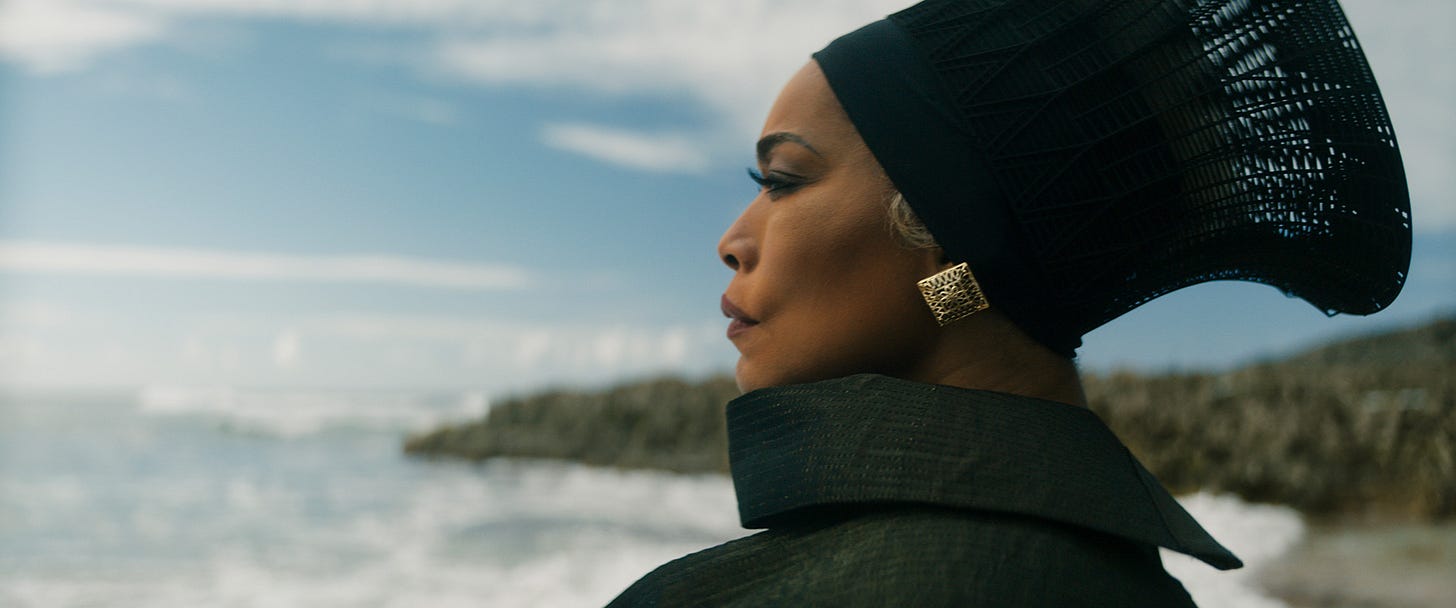
BLACK PANTHER: WAKANDA FOREVER
(now in theaters)
It’s still crazy to think that Ryan Coogler and company were ready to go with BLACK PANTHER: WAKANDA FOREVER when Chadwick Boseman passed away. To have to rework it to both facilitate a changing of the guard in-film and honor the memory of their star outside of it could not have been easy. I’m sure it was cathartic, though. To have the work to help lead them through the emotions they were feeling. So, it’s nothing short of extraordinary that they actually succeeded. And in a way that proves an organic extension of what the first film presented by way of the MCU’s best villain—a man justified in his rage, if not his actions.
Coogler and co-writer Joe Robert Cole stick to the post-colonial nature of Wakanda as a place and Wakandans as a people. Where its predecessor introduced the notion that this safe haven hidden from the world could become the staging ground for its destruction via Killmonger’s (Michael B. Jordan) desire to free Black men and women from oppression wherever they may be, WAKANDA FOREVER gives it physical form. Because that’s what Talokan is: a secret kingdom of native Aztec people who transformed themselves with a flower (similar to that which bestows the power of the Black Panther) in order to survive. While T’Challa’s ancestors threaten force for peace, Namor (Tenoch Huerta) wields it for self-preservation.
The stage is therefore set for a reckoning. With the void left by T’Challa’s death (and the path to another Black Panther destroyed via Killmonger), there comes a need to choose how to move forward. Do you let the outside world (led by the US, of course) bully you or do you fight back? It’s a question Wakanda doesn’t yet have to answer thanks to their mettle being strong enough to bat away acts of aggression. The reason it is asked, though, is because they allowed themselves to be seen. Talokan hadn’t. So, when Wakanda refuses to trade Vibranium once again, the US seeks an alternative supply. And when they come knocking unannounced on Namor’s door, political diffusion isn’t on his mind. Annihilation is. Kill all witnesses to protect their existence.
As such, Coogler isn’t supplying us another good vs. evil plot like so many other MCU chapters. Even when another director gives us a good villain, they’re still too often underwritten and underutilized to be more than a one-dimensional foil (see THOR: LOVE AND THUNDER’s Gorr). Like with BLACK PANTHER, the antagonist here has purpose. Namor seeks to protect his kingdom. If he were the star, it’d be black and white. Because he isn’t, the gray area of his desire to maintain a status quo by any means necessary pushes the real hero into a corner. Does Shuri (Letitia Wright) choose her brother’s nobility to protect her oppressors as human beings? Does she fall prey to vengeance like her cousin en route to burning it all down? Or can she reconcile both impulses to mold her own identity?
It’s a pretty compelling narrative with the perfect amount of fuel on both sides to really make us question how far off T’Challa’s path grief has taken Shuri. With new characters to help (Dominique Thorne’s Riri Williams) and old friends to lean on (Lupita Nyong’o, Danai Gurira, and Winston Duke all return), she must find the middle ground between spirituality and science, God and logic. And with Angela Bassett’s Ramonda stealing every scene to become her daughter’s rallying point, for better or worse, it all adds up to a stirring climactic battle that entertains with physically punishing action and suspense. Yes, it’s ultimately a narrative bridge for the MCU’s future, but it always strives to deliver upon its own drama first.
- 8/10
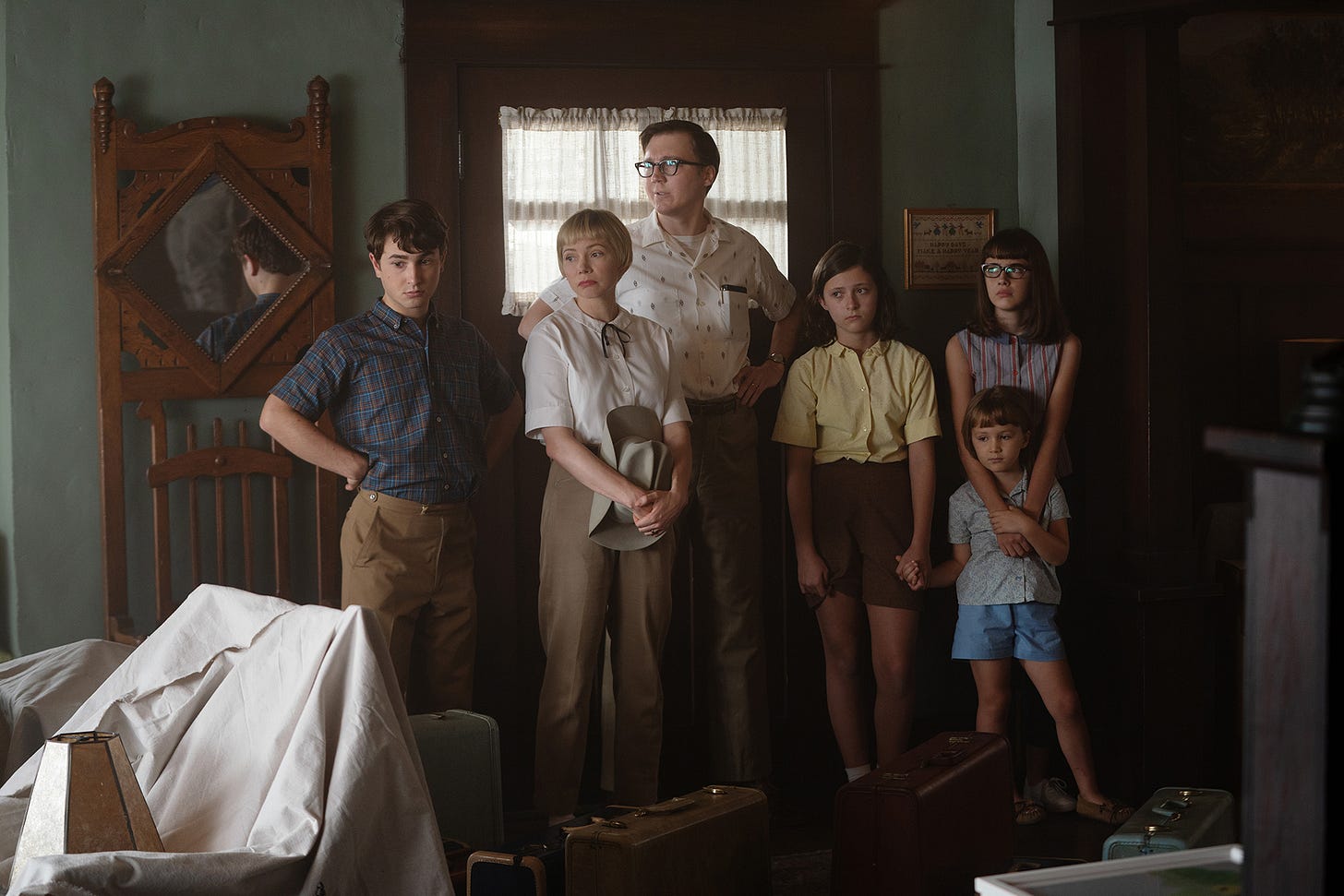
THE FABELMANS
(now on VOD/Digital HD)
Art or family. You have to choose. At least that’s what Uncle Boris tells young Sam Fabelman upon an unannounced visit to sit shiva for his recently passed sister, the latter’s grandmother. It’s probably the most lively scene of the whole film—unhinged words of wisdom that contain as much context for the slowly imploding world around Sam as advice for the future. That’s not to say the rest of Steven Spielberg’s THE FABELMANS is boring. It’s just … period-specific familial drama that’s apparently interesting because it loosely depicts the director’s own adolescence. Is that enough to pretend it delivers something we haven’t seen before? You tell me.
At two and a half hours, I’d be lying if I didn’t say it’s steady emotional horizon line remaining at the middle for the entirety flirted with becoming interminable. Spielberg’s direction is great and Tony Kushner’s script is funny and heartfelt and charming, but to what end? To tell us that art is hard? That genius is hard? That living in the shadow of either is hard? Yeah. We get it. Sam (Gabriel LaBelle) is selfish. His mother Mitzi (Michelle Williams) is selfish. Heck, even his father Burt (Paul Dano) is too, regardless of his kindness since it often stems from a pathological need to play the martyr as much as feigning reason to escape conflict. They’re all selfish and they’re all scared.
That’s why Judd Hirsch’s whirlwind entrance as Boris is so invigorating. I really thought it was going to be a turning point to inject some propulsive energy into the proceedings, but things settle back to a drone of coming-of-age antics with bullies, girls, divorce, and the inability to get out of one’s own way. It’s effective. Memorable even. But it’s also just sentimentally quaint. There are zero surprises. The family narrative is overwritten and repetitious at times. And the lessons Sam should be learning aren’t sticking to create on-screen evolution for him as much as they’re bludgeoning us with their obvious presence. It’s all very mannered in a way (performances too—sorry, Michelle). Self-conscious.
And that’s fine. The craft itself is beyond reproach. Much like Paul Thomas Anderson’s LICORICE PIZZA, Spielberg’s latest is quality entertainment that just never really wowed me. Besides Boris. And David Lynch as John Ford reenacting an anecdote I’m pretty sure I’ve seen floating around on Twitter many times in the past decade. So, while I can understand the love and, to a certain extent, the hate I’ve seen, THE FABELMANS doesn’t read as divisive to me. It’s merely a nice story told well that may be pretending it’s more because of the pedigree at its back. Maybe I’ll rewatch it again one day and appreciate it more, but I’m not necessarily counting the days until I do.
- 7/10
KIMI
(now on VOD/Digital HD and streaming on HBO Max)
I had a lot of fun with Steven Soderbergh’s KIMI. While David Koepp’s script fails horribly insofar as addressing the nuance of trauma’s effects, it does take us down a suspenseful and entertaining rabbit hole of tech world toys coming to the rescue of an unsuspecting bystander (Zoë Kravitz’s Angela) on the outskirts of a murder mystery that’s currently in the process of being erased. Why she was sent a digital clip of said crime in the batch of “error” streams flagged by her employer Amygdala (which manufactures an Alexa-type smart home device) is unclear, but she’s sure as hell not going to ignore it.
The film introduces an eccentric cast of characters, all with the sole purpose of playing their small but crucial roles in the climax. Whether it’s Mom (Robin Givens), a rowdy co-worker in eastern Europe (Alex Dobrenko), a creepy neighbor (Devin Ratray), or Angela’s regular booty call (Byron Bowers), their whereabouts, means of communication, and work schedules are precisely measured. They must be since Angela is agoraphobic (stemming from an assault and exacerbated by the ongoing COVID pandemic) and thus almost always alone. Who can she trust? Who is willing to help? Can she even push herself to leave her apartment when necessary?
There’s a nice mix of comedy and thrills with some great sound design (Angela must clean up the recording via digital and analog devices while shielding the audience from ambient sounds via soundproof headphones) as things escalate from confusion and fear to full-on violent, home invasion attack mode. Soderbergh continues his penchant for out-of-the-box casting in dramatic fare (Rita Wilson, David Wain, Andy Daly, etc.) and lets Kravitz shoulder the emotional and psychological weight of constantly being dismissed and/or neglected. Because Angela is a such an interesting, complex characterization, though, the end’s “fix-all” tone can’t help taking a bit of the film’s otherwise impressive luster away.
- 8/10
MARCEL THE SHELL WITH SHOES ON
(now on VOD/Digital HD)
A viral sensation like Marcel the Shell (Jenny Slate) works because of the cute gag of it all. I don’t think there’s any denying that fact. Short, sweet, and funny. To therefore expand that gag to feature-length status lies more in the story that can be created to allow for said expansion than the joke itself. Because watching this tiny shell use other tiny things to have fun and live his life is one thing, but making us care for his plight as a three-dimensional character is another. Dean Fleischer Camp, Slate, and their co-writer Nick Paley had the hook, now they needed to create a purpose.
Well, just like the found objects that get lost through the cracks of the human world for Marcel to repurpose in his day-to-day existence, he and his family are of an easily misplaced size too. MARCEL THE SHELL WITH SHOES ON is thus the story of his quest to find his loved ones again. Camp arrives as the latest Airbnb renter of the house owned by Larissa (Rosa Salazar) and Mark (Thomas Mann) that serves as Marcel’s entire world. Their bad break-up led to a hasty exit that presumably caught all the other living shells and trinkets in its wake. What had been a thriving community was now just Marcel and his grandmother Connie (Isabella Rossellini)—an endearing duo Camp can’t help but film and post online.
The whole is an interesting commentary on internet culture (“fans” come to take selfies in front of the house, ignoring Marcel’s eventual plea to find those he lost), but also a wonderful parable about conquering fears and allowing oneself to not accept being alone. There’s always a balance since nobody wants to lose all sense of privacy, but the ability to be vulnerable and pursue happiness is something we should all embrace. Who knows? Maybe Lesley Stahl and “60 Minutes” will be there to guide your first steps towards change too.
It’s an utterly charming, (mostly) stop-motion adventure of the soul with genuine laugh-out-loud moments (Slate’s comedic timing is off-the-charts) and heartwarming drama (Rossellini steals scenes with an abundance of love) to keep us invested in moments big and small. Because watching Marcel and Camp riff on the ingenious (tennis ball “rovers”), disgusting (the hardiest material for durable string comes from the bathtub drain), and absurd (Marcel always over-prepares for that which he cannot know awaits outside his home’s walls) is enough to earn a smile. To get that and a resonant, introspective look at life, longing, and love almost feels like a feat of magic.
- 8/10
NANNY
(now streaming on Amazon Prime)
Nikyatu Jusu’s feature debut NANNY is an intriguing psychological horror dealing with misogyny and racism while also providing a supernatural fantasy wherein a mermaid-like monster from African folklore arrives less as the bringer of death than a harbinger desperate to warn those who death has already found. It’s a stunningly directed work with gorgeous cinematography and a suspenseful structure augmented by score and performance. We become so worried about what might happen to Aisha (Anna Diop) in the here and now that we forget the real nightmare might have already unfolded from afar.
It becomes a juggling act as a result—one that ultimately feels a bit manipulative considering how much of the danger we’re expected to anticipate reveals itself to be a red herring. Not that the terror of being put on display as an “other” within the affluent white family who employs Aisha as a nanny isn’t real. He (Morgan Spector) makes a living from photographing Black suffering and she (Michelle Monaghan) is too caught up with her own struggles as a working woman to even begin to acknowledge the ways in which she exploits Aisha are worse than the ways her male coworkers exploit her.
Where things get shaky is the assumption that our focus be set upon that dynamic. What’s going to happen in this house? Jusu isn’t afraid to bring Aisha’s suffering there, making us believe it’s a ground zero through geography when reality proves it only feels that way due to proximity to her. I would have loved some room at the end to reconcile this gray area, but the denouement moves so fast that the film simply sweeps it under the rug as though it truly was just a distraction instead. The climax is still a gut punch and everything that happens afterwards works in concert with Aisha’s journey, but it renders much of the drama moot.
I guess that could be intentional too. Jusu exploiting our expectations when it comes to these types of films to deliver a horror that, like Leslie Uggams’ “intuitive consultant” explains from her own experience, focuses on the system rather than the players. It’s not therefore about Aisha versus her employers as much as what they each represent. It’s about how white society uses and abuses Black bodies for their own gains while ignoring the human and emotional cost because they believe a transference of financial currency makes up the difference. In the end, however, they all lose as capitalism cares little for either side. We’re all expendable cogs to a dehumanizing machine.
- 7/10
Cinematic F-Bomb -
Another favorite, this one from TREMORS. Kevin Bacon kills this line reading. (Substack apparently can’t handle an embedded gif, so you’ll have to click over for a smoother experience. Or see everything at cinematicfbombs.com.)
New Releases This Week:
(Review links where applicable)
Opening Buffalo-area theaters 12/16/22 -
AVATAR: THE WAY OF WATER at Dipson Amherst & Flix; AMC Maple Ridge & Market Arcade; Regal Elmwood, Transit, Galleria, Quaker Crossing & Niagara Falls
CAT DADDIES with select times at North Park Theater
EMPIRE OF LIGHT at Regal Galleria & Quaker Crossing
“We bask in the period detail and cringe at the on-the-nose dialogue that always reminds us how "different" our two leads are. Colman and Ward are both very good, but neither can transcend the cardboard cutouts they're asked to play.” - Full review at jaredmobarak.com.
NATIONAL LAMPOON’S CHRISTMAS VACATION with select times at North Park Theater
THE NIGHT BEFORE with select times at North Park Theater
Streaming from 12/16/22 -
THE APOLOGY - AMC+ on 12/16
BARDO, FALSE CHRONICLE OF A HANDFUL OF TRUTHS - Netflix on 12/16
“Some of what Iñárritu creates works better than others, but it all comes from the heart. The artistry and cinematography prove next level regardless.” - Full review at jaredmobarak.com.
NANNY - Amazon Prime on 12/16
Thoughts are above.
THE VOLCANO: RESCUE FROM WHAKAARI - Netflix on 12/16
THE KINGDOM EXODUS - “Barbarossa” - MUBI on 12/18
A SHORT STORY - MUBI on 12/21
Now on VOD/Digital HD -
BANSHEES OF INISHERIN (12/13)
“Gleeson and Farrell play their roles to perfection despite being drawn as two-dimensional pawns in McDonagh's game—two sides of the same broken coin, doubling down when the opportunity for growth presents itself because they're too entitled to listen.” - Full review at jaredmobarak.com.
A CHRISTMAS STORY CHRISTMAS (12/13)
THE FABELMANS (12/13)
Thoughts are above.
GOODBYE, DON GLEES! (12/13)
MEMORIES OF MY FATHER (12/13)
ONODA: 10,000 NIGHTS IN THE JUNGLE (12/13)
THE ALMOND AND THE SEAHORSE (12/16)
THE APOLOGY (12/16)
HIGH HEAT (12/16)
LULLABY (12/16)
MINDCAGE (12/16)




